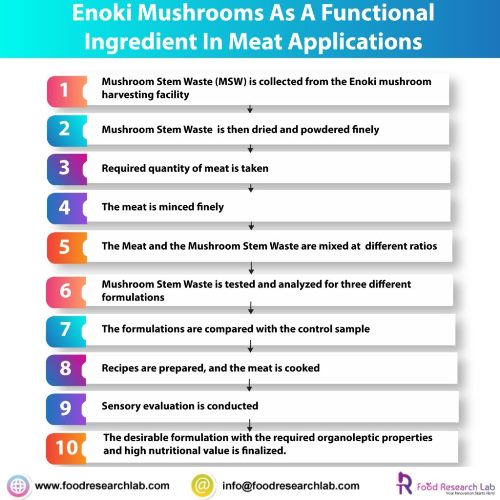Mushrooms are rich in high quality proteins, vitamins, minerals, fibers and phenolic compounds are considered to be healthy ingredient in a lot of cuisines. Enoki (Flammulina velutipes) mushrooms are also popularly known as velvet stem, golden needle, and winter mushrooms are very much recognized for their distinct flavour and nutritional profile. Enoki mushrooms have a pure white bean sprout on a velvety stem. Moreover, cultivated varieties have a little white cap and the wild variety have a larger brown shiny cap. Generally, the stems are removed during mushroom harvest and are used for composting.
Application of Enoki Mushrooms for Healthier Meat Formulation
Mushrooms are rich in high quality proteins, vitamins, minerals, fibers and phenolic compounds are considered to be healthy ingredient in a lot of cuisines. Enoki (Flammulina velutipes) mushrooms are also popularly known as velvet stem, golden needle, and winter mushrooms are very much recognized for their distinct flavour and nutritional profile. Enoki mushrooms have a pure white bean sprout on a velvety stem. Moreover, cultivated varieties have a little white cap and the wild variety have a larger brown shiny cap. Generally, the stems are removed during mushroom harvest and are used for composting.
In recent times, there is demand for plant based materials with functional properties to be used as alternative ingredients. One such application is the Enoki mushrooms stems incorporation in meat products to add a source of fibers and nutrients such as polyphenols, vitamins and minerals. These combinations of antioxidant dietary fivers (ADF) are consumed to improve gastro intestinal health and to inhibit lipid oxidation in foods, to extend their shelf life. (1)
Enoki mushrooms extract have numerous nutritional attributes. For instance, low calorie density, high lipid profile enhances protein and phenolic contents. These mushroom extracts have been reported to have a strong antioxidant potential with a huge 2, 2-diphenyl-1-picrylhydrazyl (DPPH) radical scavenging as well as metal chelating ability. The dietary fiber extract is proven to reduce triacylglycerol, low-density lipoprotein levels in the blood and total cholesterol.
Previously Enoki mushroom extracts have been used to fortify foods such as biscuits, cookies and cakes. Very limited studies have been carried out on meat products. Oyster mushrooms for example have been using in pork meat to provide glutinous fermented sausage. Dried Portobello mushroom has been used on spicy sausages to enhance the final texture of meat emulsions. Physiochemical and sensory properties, such as colour, texture and cooking characteristics of beef patties was improved with oyster mushroom extracts. (2)
2.5% of mushroom flour from Agaricus bisporus and Pleurotus ostreatus was used to obtain a feasible alternative to enhance the nutritional profile of beef patties. The fiber content and reduced fat with accepted salt levels and sensory profile. However, increased percentages of mushroom stream waste extract were found to severely impact the sensory properties of final product to intensify the umami flavor. This inclusion of mushroom extract in meat products has been proven to represent an opportunity to add value to final food product. In addition, Enoki mushroom has been used as a potential substitute for antibiotics in rearing organic chicken for eggs production.
Experimental findings of making goat/lamb nuggets, minced meat (e.g. ultra low fa chicken patties) products with MSW
Mushroom stem waste (MSW) was collected from the harvesting Enoki mushrooms facility and were dried and powdered finely. Goat meat was procured from a local supermarket and stored in the freezer until further processing. Goat meat was minced finely upon thawing and mixed with mushroom stem waste at different ratios. Enoki mushroom stem waste was analyzed and tested in three different formulations; T2 (2%), T4 (4%) and T6 (6%) and compared with simple control.
The total phenolic content of the MSW was found to be 6.36 mg GAE/g dry weight based on the Gallic acid standard. The antioxidant potential was found to be 84.2% DPPH scavenging, 41.3% ferrous chelating ability and 60.1% reducing power. Overall, we can understand that the enoki mushroom stem wastes are an excellent source of natural antioxidants.
The pH of the goat meat was around 6.3, but the addition of 6% MW significantly increased the pH to 6.44. However, the incorporation of Enoki mushroom stem waste did not have a significant impact on moisture, fat content and protein levels of the meat products. The impact of including enoki mushroom stem waste on the textural parameters, such as springiness, cohesiveness, hardness and gumminess were found to be slightly reduced compared to the control samples and not significant. The myofibrillar proteins from meat are related to the gelation are formed by the dietary fibers from the plants.
The enoki powdered MSW had oxidative stability was measured by lipid oxidation products, such as primary (PV) and secondary (TBARS). Fortified products (T2, T4, and T6) had significantly lower levels of peroxide values. Hydro peroxides are the main output from lipid oxidation reaction. Apart from supplementing the dietary fiber, mushroom stem waste was found to retard lipid peroxidation during refrigeration time of storage. The secondary products were found to rise as a function of storage. This impact of mushroom stem waste is related to the high phenolic content, vitamin C, ergothioneine, dietary fiber, vitamin iron binding ability. Enoki mushroom stem waste extracts have also been shown to prevent lipid oxidation and discolouration in fish products.
An average person ingests only 0.15~0.45 g of mycosterol in their daily diet. Additional supplementary mycosterol is required in the daily diet for cholesterol reduction,. Large amounts of meat and fat are ingested in our daily diet. Suppose sufficient mycosterol is contained in the diet. In that case, it will compete with cholesterol in the intestinal tract so the body can absorb less cholesterol, and the blood cholesterol could be reduced. F. velutipes contains rich dietary fibre, which accelerates cholesterol decomposition and hence can reduce TG, TC, and LDL levels in the blood and TG, TC, and phospholipid in the liver.(4)Mycosterol can reduce total cholesterol and LDL in the blood. Taiwan has a high yield of Flammulina velutipes all year round, which has been developed into supplementary nutritional foods, and it is becoming an interesting research subject in the 21st century.

In sum
The mushroom stem waste from Enoki was found to exhibit significant antioxidant potential and is attributed to free radical scavenging activity, metal chelating ability and ferric reducing power. The application of mushroom stem waste in meat products, such as goat meat mince to make nuggets was found to increase the overall nutritional content such as dietary fiber and ash content. Moreover, the mushroom stem waste extract was found to improve the cooking yield and did not change the appearance, colour and external texture of the final product compared to the control sample. To finish, the mushroom extract significantly improved the shelf-life of the goat meat nuggets, which is attributed to its ability to inhibit lipid oxidation during storage. Enoki mushroom stem waste was found to improve the shelf-life, physiochemical properties and nutritional profile by 4% when compared to the control samples.
Food Research Lab can help you solve these problems with related to formulation of low fat and low salt meat products with extended shelf life using Enoki mushroom. FRL is for food and nutraceutical manufacturers as well as those companies involved in NPD and developing spec without manufacturing. FRL gives you the ability to improve all phases and aspects of new product development, such as original specification, ideation, shelf-life, packaging. Additionally, you can get them out to market quicker than ever before.

Let’s create something Innovative and Delicious together
Food Research Lab strives for excellence in new Food, Beverage and Nutraceutical Product Research and Development by offering cutting edge scientific analysis and expertise.




